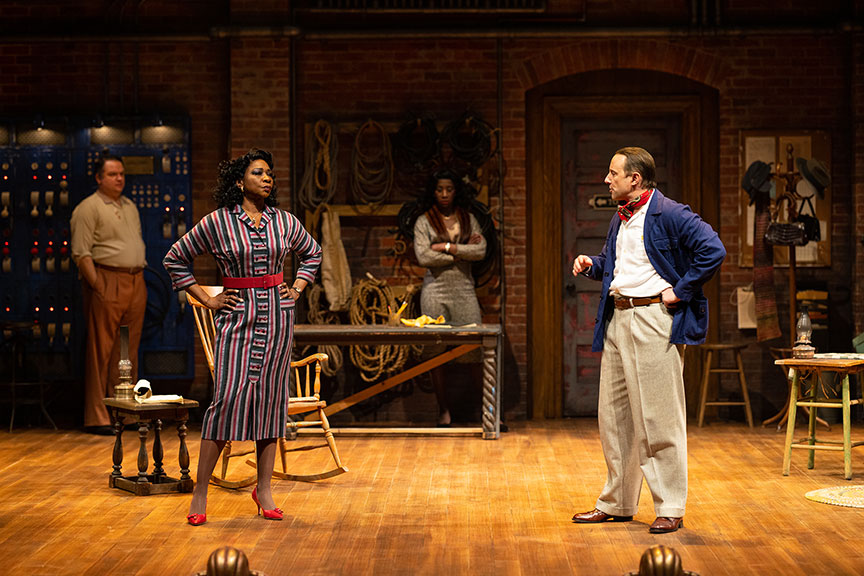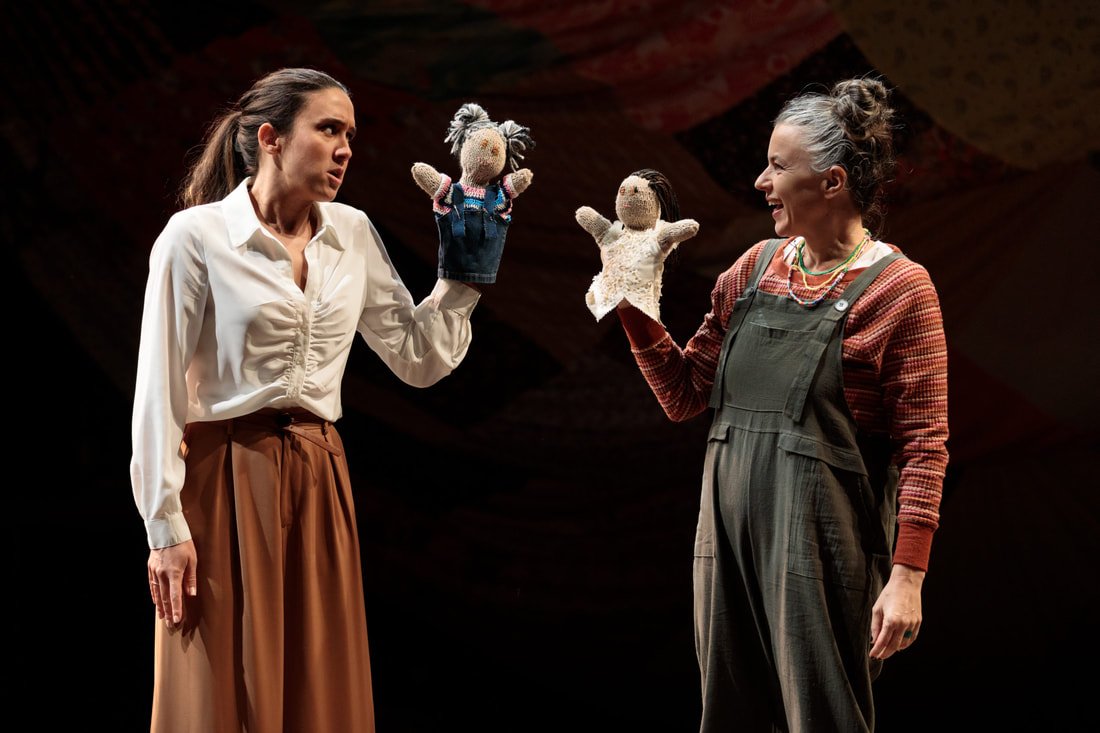|
Jessica John, dancing up a storm as Beverly, in "Abigail's Party." Photo by Daren Scott In the British comedy of manners (both good and bad) “Abigail’s Party” the party isn’t Abigail’s at all. She’s a 15-year-old having a bash next door to the affair her mum is attending – enduring would be more like it. The hostess of that party is Beverly Moss, who is rabid that everyone under the roof of her London flat has a good time. Especially herself.
Always ones for a lively bit of fun, Backyard Renaissance has chosen Mike Leigh’s often-produced 1977 play to kick off its seventh season. Company co-founders Jessica John and Francis Gercke, playing hostess-with-the-mostest (the most booze and cigarettes maybe) Beverly and her buttoned-up spouse Laurence, lead a cast of five at the Tenth Avenue Arts Center downtown. Liliana Talwatte and Carter Piggee portray Angela and Tony, the new neighbors invited over to be plied with drinks and unsolicited advice. Michelle Marie Trester is Sue, the older, more staid neighbor (and that aforementioned mother of Abigail, remember). The lengthy first act is spent mainly with the principals sitting around Beverly and Laurence’s living room, decorated for garish ‘70s authenticity by Tony Cucuzella with retro furniture, a Princess phone and a phonograph used throughout the play as a source of antagonism between the unhappily marrieds. There are loads of intentionally uncomfortable silences and passive aggressions from Beverly. But the pace is languid. The apparent climax of Act I is Sue throwing up – fortunately offstage. As everything revolves around the narcissistic Beverly, “Abigail’s Party,” which is directed by Rosina Reynolds, is most dynamic when Jessica John is on her feet: solo dancing to records by Donna Summer, Tom Jones or Demis Roussos, or determinedly fetching refill after refill of cocktails from the bar. The second act flares with multiple confrontations and some dark comedy that becomes high drama, all to the beat of the muffled music emanating from the teenagers’ unseen reveling next door. Leigh most certainly instilled some commentary on social class and upward mobility in his script, which also became a popular BBC television movie. If, however, a lesson was supposed to have been learned by (mostly) Beverly at play’s end, it’s not at all clear. The Backyard Renaissance ensemble gamely carries this tale to its conclusion. John, always entertaining, has the showy role of course. Trester, the next most interesting on stage, manifests that very British --and very appropriate for the goings-on in “Abigail’s Party” -- quiet desperation. A little credit, too, to dialect coach David Huber. The actors, especially Gercke, sound British enough to make you long for a cup of tea. Or in this case, a gin and tonic. "Abigail's Party" runs through March 19 at the Tenth Avenue Arts Center downtown.
0 Comments
Jesse J. Perez and Zilah Mendoza in "El Borracho." Photo by Jim Cox El Borracho – the drunk – is one of the images on a loteria card played in a kind of Mexican bingo. He’s on his feet, barely, and waving around a bottle of tequila. A good-time, party character, right?
Wrong, as anyone haunted by a loved one’s alcoholism will tell you. That’s what makes the Old Globe’s production in the round of Tony Meneses’ “El Borracho” so engrossing, yet so uneasy to watch at times. Raul (Jesse J. Perez) is deteriorating and dying after a lifetime of unchecked alcoholism and he’s doing so in the home of his ex-wife Alma (Zilah Mendoza) where any happy memories are drenched in booze and despair. The third figure in the drama is son David (Matthew Martinez), who is torn between wanting to still love his father and wanting to retreat to his own life away from the claustrophobic one-bedroom apartment. Obligation is at war with conscience, revulsion at war with duty, disillusionment at war with love. On top of that, David has a secret, one he fears to share with his father, though he knows he must. Time is short. Edward Torres knows how to maximize the Globe’s intimate Sheryl and Harvey White Theatre well, having previously directed both “Water By the Spoonful” and “Native Gardens” here. “El Borracho’s” space is a dark little world into which the audience is immersed. The modest apartment (kitchen, living room with sleeper sofa, dining area) feels inescapable for all members of the family. The set by David Israel Reynoso is surrounded by liquor bottles. Lots of them. I haven’t seen so many since I agonized through the film “Leaving Las Vegas” with Nic Cage. That discomfort returned, more viscerally, in the environment of live theater. There are a few humorous moments in “El Borracho,” and the opening-night audience responded to them with more laughter than I could muster. I’ve never found drunkenness funny. Even Raul’s costumed, guitar-playing performance near the end of the play left me cold, its dramatic intentions notwithstanding. As balls out as Perez’s performance is as Raul, I was most affected by Mendoza’s quieter turn as Alma. While the script emphasizes son David’s internal complications and relationship to his disintegrating father, it’s really Alma, living under the same roof with Raul and having a much longer history with him in every way, who’s most deeply suffering regret, resentment, fear and more. Yet Mendoza never overplays her hand. She is the Other that is subject to so many alcoholism-racked families’ distress and misery. Alma’s pet birds in a cage is a too-obvious metaphorical device. She’s trapped enough as it is. “El Borracho” strives to convey tenderness, elusive as it is when anger is so understandably predominant and surrender so tempting. That is the alcoholic home. They are everywhere. “El Borracho” runs through March 20 in the Old Globe’s Sheryl and Harvey White Theatre in Balboa Park. Ramona Keller and Kevin Isola in "Trouble in Mind." Photo by Rich Soublet II As I sat in the Old Globe Theatre audience during a performance of Alice Childress’ “Trouble in Mind,” I was reminded of the current Brian Flores story. The African-American fired head coach of the Miami Dolphins is suing the National Football League and three of its teams alleging racial discrimination in the hiring and retaining of Black coaches. In taking a stand for himself and others, Flores could be committing career suicide, at least in terms of head coaching an NFL franchise anytime soon or ever again.
In Childress’ 1955 play-within-a-play, African-American actress Wiletta Mayer defies the director of a white playwright’s “Chaos in Belleville,” the story of which culminates with a Black mother whom Mayer is portraying urging her son on the run from a would-be lynch mob to just give himself up. In so doing, Mayer turns her back on her career in acting, which is all she knows. Seven decades after “Trouble in Mind” premiered, our racism-wrought society demands courage from those who can speak out for justice and dignity, in whatever arena. Some can. Some can’t. Some won’t. This is what makes the play so urgent today. The Globe’s production of “Trouble in Mind” is directed by Delicia Turner Sonnenberg, who also directed a staging of the play in 2015 at Moxie Theatre in Rolando where she was founding artistic director. I don’t remember enough of the Moxie production to draw any comparison between it and this one, but I do know that Turner Sonnenberg is one of the most gifted directors in town, and that’s evinced in the performance of this Old Globe ensemble, particularly Ramona Keller as Wiletta Mayer. The gradual building and building to her eventual breaking point is genuine and organic, conveyed as much in her face and how she moves – or doesn’t move -- as in words. When she does speak, her righteousness is never empty oratory. The play itself, however, is slow in getting started as one by one most of its characters are introduced. It isn’t until a first run-through of a scene from the script that the tension of “Trouble in Mind” begins to simmer. An issue, too, is the character of the director, Al Manners (Kevin Isola), whose last name advertises what he absolutely doesn’t have. He’s condescending, arrogant and bullying to the point that we wonder why anyone would work for or with him, and we wonder too why it takes so long for Wiletta to speak her piece. A sequence in which Sheldon Forrester (Victor Morris), an elder Black member of the cast, recounts witnessing a lynching is as chilling as you’d expect. Coming when it does in the play, it also serves the purpose of fortifying Wiletta’s objections to the climax of “Chaos in Belleville.” As Alice Childress once said: “The Black writer explains pain to those who inflict it.” In “Trouble in Mind,” Wiletta Mayer tries to explain that pain to Al Manners, whose response is right out of the Trump era playbook: a tantrum and an abhorrent attempt at victimhood. Just more evidence that 1955 isn’t as long ago as we think. "Trouble in Mind" runs through March 13 at the Old Globe Theatre in Balboa Park. Emily Shackelford (left) and Beatrice Basso in "Life Sucks." Karli Cadel Photography Say this for Aaron Posner: He knows how to make Chekov entertaining. Look no further than Cygnet Theatre in Old Town, which in 2016 staged Posner’s “Stupid Fucking Bird,” an irreverent adaptation of the Russian playwright’s “The Seagull,” and which is now presenting the West Coast premiere of Posner’s “Life Sucks,” a loose and intrepid take on “Uncle Vanya.”
The title of this play would seem germane to the times we’re living in, and sure enough Posner, who has also adapted Chekov’s “Three Sisters,” has made changes in the original “Life Sucks” script to reflect on our pandemic existence. “The play is very different from when I wrote it in 2015 because the world is so different,” Posner is quoted as saying in the Cygnet program. Without having seen “Life Sucks” before this regional premiere, I can only say that if Posner reinvented the play for COVID commentary it is subtle. Without shouting out what we already know, “Life Sucks” the 2022 version redoubles what Posner is saying about no one being promised a perfect life, about how sometimes things do feel hopeless and that maybe it does suck to be here. Look no further than the dreaded family gathering. As a wise person once opined: There’s a lot to be said for family, and a lot to be said against it. That certainly pervades the whole of Chekov’s “Uncle Vanya,” in which such a gathering at a rural estate traffics in resentment, confrontation, self-recrimination, despair, a shooting … and I’m just getting started. In Posner’s “Life Sucks,” he checks all the Chekov boxes. The events may be taking place in the now and not the Russia of the 1890s, but they’re just as melodramatic. At first. In “Life Sucks,” Sonya (Savanna Padilla) and her Uncle Vanya (MJ Sieber) are sharing uncomfortable space with The Professor (Frank DiPalermo) and his much younger third wife Ella (Emily Shackelford), over whom both Vanya and his best friend Dr. Astor (Jorge Rodriguez) are hot to bed. The lonely Sonya feels the same way about the dashing doctor. Also in the mix: the sassy Aunt Babs (Patty Gallagher) and the eccentric lesbian Pickles (Beatrice Basso). What happens through four half-hour acts runs very much parallel to “Uncle Vanya,” but Posner takes significant liberties, as in having his characters break the fourth wall to quiz and goof with the audience (really, the best part of this Cygnet production) and contemporizing their language and first-world problems. Benefiting from the freewheeling pacing directed by Cygnet’s Rob Lutfy (who also directed “Stupid Fucking Bird”) and the riffing with the audience and with each other, this cast thrives on and exploits to consistently amusing effect the make-it-up-as-you-go-along momentum of the production. Everyone gets a moment to shine, though Shackelford as Ella makes anyone in a scene with her just as funny as she is, and no one interacts with the crowd better. Sieber shifts between self-deprecation and tantrumming as Vanya, bringing to mind how, say, Kevin James might have played this role. I got quite the kick out of DiPalermo’s arrogant, pedantic Professor, reminding me as he did of some of the academics to which I’ve been subjected. As in “Uncle Vanya,” the Sonya character is possibly the most sympathetic. Padilla gets sympathy but also gets laughs. Admittedly, the final act of “Life Sucks” turns “serious” with its life-affirming testimonies and what could practically be called piety. So what? If that’s what it takes to keep us from believing the two words that compose the play’s title I’m good. Truth is, life may seem like it sucks sometimes, but it doesn’t. When you can laugh when you didn’t think you were capable of laughing, you know you’re going to be all right. "Life Sucks" runs through Feb. 27 at Cygnet Theatre in Old Town. Enrique Xavier Martinez and Nancy Ross in "Sapience." Photo courtesy of Moxie Theatre What we have with “Sapience” is a failure to communicate. Primatologist Elsa (Mariel Leon) struggles to establish a workable “language” with Wookie, the orangutan she’s studying, (Nancy Ross). Elsa’s Latinx sister Miri (Vanessa Duron, who also directs this world-premiere co-production from Moxie Theatre and TuYo Theatre) aches to get through to and bond with her autistic son AJ (Enrique Xavier Martinez). That’s not all. The expressive Miri is frustrated by the emotionally constipated Elsa. Elsa’s ex-boyfriend Jason (Alexander Guzman), who still cares for her when he’s not drumming up funding for the research institution, can’t persuade her to care back, even when he faces a deadly cancer diagnosis. Yet with all these disconnects, Diana Burbano’s one-act play elucidates beautifully what lies beneath them: the anxious yearning to communicate, to feel, to matter. Only in a pair of short, audience-facing Elsa monologues near its conclusion does “Sapience” go “message play” on us. Most of its 90 or so minutes find its characters – even the stifled Elsa – discovering within their sterile environment little joys. As when AJ delights at comparing Wookie’s language-sounds machine to his own. Or when Jason uses David Bowie’s rousing “Heroes” to get Elsa up on her feet to (briefly) dance. Or almost anytime the play’s omnipresence, Wookie, delights in the “hairless humans’” idiosyncratic behaviors. “Sapience’s” breakthrough communication is the one quickly (perhaps too quickly?) achieved between AJ and Wookie, the two “nonverbals.” Their fast friendship born of loneliness begins playfully, but as the narrative darkens they together confront the realities of their isolations. When, in talking about Jason, AJ reveals to the orang the reality of life giving way to death, they seem to drift apart. It’s a sad moment for them. And for us. In the starring role, Leon is challenged with making Elsa, who appears devoid of compassion, a character about whom we care. She does the best she can considering the rather strained backstory given her. Ross, meanwhile, is wondrous as Wookie. Her physicality is impressive, her facial expressions alternately mischievous and affecting. Noteworthy too is young Martinez in his stage debut as AJ. He was a student in the Options For All program run by this production’s inclusion specialist, Samantha Ginn. Burbano, through the impassive but intelligent Elsa, asks us to accept that everything is normal, to accept neurodiversity. But Elsa it turns out wants more for herself. “Sapience” asks: Will she get it? “Sapience” runs through Feb. 27 at Moxie Theatre in Rolando. |
AuthorDavid L. Coddon is a Southern California theater critic. Archives
July 2024
Categories |
David Coddon |
|




